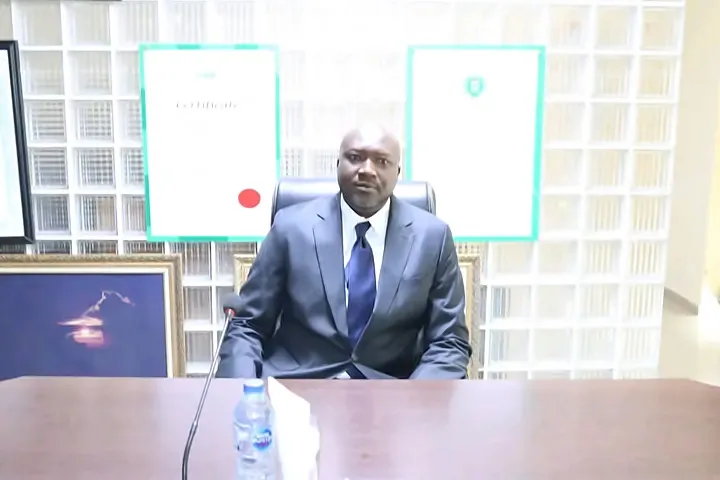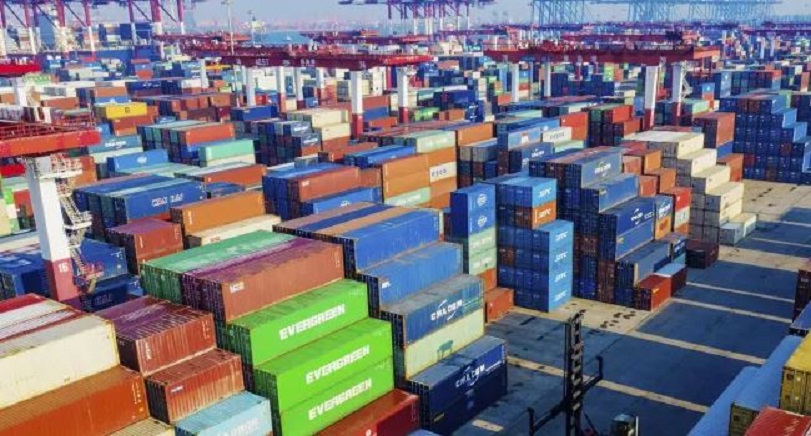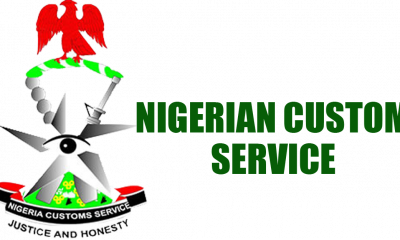General
Nigerian Senate Queries Customs’ Non-Remittance of Surplus

By Adedapo Adesanya
• NCS Achieves Almost 60% of Targeted Revenue in Five Months
The Nigeria Customs Service (NCS) has reached 59.9 percent of its target revenue of N957 billion for the 2020 fiscal year as it announced raking N573 billion between January and May.
But the Senate Committee on Customs raised questions over non-remittance of operation surplus every year by the service.
This followed the announcement made by the Comptroller-General of Customs (CG), Mr Hameed Ali, at an interactive session on revenue generation with the Senate Committee on Customs on Thursday.
Mr Hameed, represented by Deputy Comptroller-General (DCG), Human Resources, Mr Sanusi Umar, said the customs was able to realise more than half of the targeted revenue for the year due to blockage of identified leakages.
“As a result of blocking of identified areas of leakages and free flow of traffic for importers during the COVID-19 lockdown, our revenue generation increased rapidly to about N6 billion to N7 billion per day, making us rake in N573 billion within five months which is more than half of the N957 billion targeted revenues for us in 2020.
“The target given to the service in terms of revenue was N1.6 trillion but due to the COVID-19 pandemic the target was reviewed to N957 billion,” he said.
Mr Ali was, however, taken up by the committee members on non-remittance of surpluses made every year, particularly in 2018 and 2019.
A member of the committee and retired custom officer, Mr Francis Fadahunsi, (PDP – Osun East), queried why the agency did not reflect the surpluses in its reports presented to the committee.
“In 2019 alone, you made surplus of N34 billion, which is not reflected in the 2020 reports before us,” he said.
Another member of the committee, Mr Sulaiman Kwari (APC – Kaduna North), challenged officials of customs to explain what they do with such surpluses.
But the customs representative in his response told the committee that the NCS was not a treasury-sponsored agency that was expected to make returns to the treasury on any amount not spent.
“Customs is now a performance-based agency.
“We are not a treasury-sponsored agency, which normally makes return to the treasury of any amount not spent.
“Where we have any shortfall, we don’t have anybody backing us and we cannot borrow from the bank,” he said.
Members of the Committee led by Mr Francis Alimikhena (APC – Edo North), however, disagreed on whether to revert the targeted revenue for customs in 2020 to N1.6 trillion as earlier passed in December or retain it at N957 billion proposed in the revised budget.
Also, while Mr Gyang Istifanus Dung (PDP – Plateau North), called for upward review of the targeted revenue, but Mr Adamu Aliero (APC – Kebbi Central), disagreed.
According to Mr Aliero, the N957 billion targeted in the revised budget is even not realisable as effects of COVID-19 will start reflecting in the agency’s revenue collection from July.
The Chairman of the Committee, Mr Francis Alimikhena, alongside another member Mr Fadahunsi, however, told the Customs officers to sustain the constant high revenues intake the agency recorded within the last five months.
Mr Fadahunsi specifically said that the target was a lazy way of collecting revenues.
“Customs can do more than it has done within the last five months in terms of revenue collections if other ports like Port Harcourt and Calabar are focused like Lagos.
“We cannot continue to approve loan everyday just as government cannot continue to be financing budget with borrowings every year.
“Enough revenues must be generated by relevant agencies like Customs, the very reason this committee invited its top management staff for brainstorming on way out,” he said.
General
NIMASA Rallies Stakeholders’ to Develop National Action Plan

By Adedapo Adesanya
The Nigerian Maritime Administration and Safety Agency (NIMASA) has pledged its commitment to provide the regulatory leadership, technical coordination, and stakeholder engagement required to successfully develop and implement a robust National Action Plan on maritime decarbonization in Nigeria.
The Director General of the agency, Mr Dayo Mobereola, made this known during the National Stakeholders’ workshop on the development of a National Maritime Decarbonization Action Plan, further describing the workshop as a critical step in actualising the Federal Government’s blue economy and climate objectives.
Represented by the Executive Director, Operations, Mr Fatai Taiye Adeyemi, the NIMASA DG underscored the significance of the IMO GreenVoyage2050 Project, a technical cooperation initiative /designed to support developing countries in implementing the IMO GHG Strategy.
According to him, the National Action Plan being developed will reflect national realities, leverage existing capacities, address identified gaps, and align with broader economic and environmental priorities of the federal government.
Mr Mobereola stressed that “this transition is not merely about compliance with international obligations, it is about safeguarding our marine environment, protecting public health, strengthening the blue economy, and ensuring that our maritime industry remains competitive and future-ready”, the DG said.
Also speaking at the event was the Technical Manager of the IMO GreenVoyage2050 Project, Ms Astrid Dispert, who highlighted that the overarching objective of the initiative is to advance a coherent and globally aligned regulatory framework to accelerate maritime decarbonization.
She also emphasised that NIMASA plays a pivotal role in driving the project at the national level.
The IMO GreenVoyage2050 Project provides technical expertise and institutional support to assist countries in developing and implementing National Action Plans that promote sustainable shipping practices, encourage investment in clean technologies, and strengthen capacity for long-term emissions reduction.
Through this collaboration, the federal government is advancing deliberate steps towards maritime decarbonization, reinforcing its commitment to global climate goals and ensuring a cleaner, greener, and more sustainable future for the sector.
General
BPP Mandates Digital Submission for MDAs From March 1

By Adedapo Adesanya
The Bureau of Public Procurement (BPP) has directed all Ministries, Departments and Agencies (MDAs) to comply with its digital submission process effective March 1.
The directive was contained in a circular signed by the Director-General of the Bureau, Mr Adebowale Adedokun, noting that the move was part of the bureau’s commitment to digital transformation and paperless governance.
It explained that the transition followed an earlier circular of Aug. 4, 2025, which introduced electronic submission procedures.
According to the bureau, it has successfully moved from physical filings to a dedicated e-mail service for document submissions and is now advancing to a more robust and integrated system.
The circular announced the inauguration of the BPP Digital Submission Portal, a web-based platform designed to enable MDAs submit procurement-related documents directly to the Bureau.
It stated that the automated platform would streamline the submission process, enhance transparency and ensure accelerated tracking of procurement-related documents and petitions.
“With effect from March 1, all MDAs will be required to use the portal to submit requests for ‘No Objection’ Certificates, approvals for ‘No Objection’ for special procurements, clarifications and status updates on submissions,” the bureau said.
It added that the portal would be hosted on the Bureau’s official website and would become fully operational from the effective date.
The bureau warned that physical submissions or manual hand-deliveries would no longer be prioritised and would eventually be rejected following the full transition to the digital platform.
It urged accounting officers to brief their procurement departments and ICT units on the development to ensure seamless processing of procurement activities from March 1.
It further advised MDAs to contact the Bureau via its official email for information on the onboarding process and integration into the portal.
The bureau emphasised that full compliance by all MDAs was required to ensure a smooth transition and avoid delays in the implementation of the 2026 fiscal year procurement processes.
General
Senate Seeks Removal of CAC Boss Hussaini Magaji

By Adedapo Adesanya
The Senate has asked President Bola Tinubu to remove the Registrar General of the Corporate Affairs Commission (CAC), Mr Hussaini Ishaq Magaji, from office.
The Senate Committee on Finance, while passing a resolution in Abuja on Thursday, accused Mr Magaji, a Senior Advocate of Nigeria (SAN), of failing to honour the Senate’s invitations to account for the finances of his agency.
“He refused on so many occasions to honour our invitation to appear before this committee.
“We have issues with the reconciliation of the revenue of CAC.
“Each time we invite him, he gives us excuses,” the Chairman of the committee, Mr Sani Musa, said as the committee passed the resolution.
CAC was part of a group of agencies that the House of Representatives Public Accounts Committee (PAC) recommended zero allocation for the year 2026, for allegedly failing to account for public funds appropriated to them.
The committee, at an investigative hearing held two weeks ago, accused CAC and some other ministries, departments and agencies (MDAs) of shunning invitations to respond to audit queries contained in the Auditor-General for the Federation’s annual reports for 2020, 2021 and 2022.
The PAC chairman, Mr Bamidele Salam, stated that the National Assembly should not continue to appropriate public funds to institutions that disregard accountability mechanisms, saying this will create fiscal discipline and strengthen transparency across federal institutions and conform with extant financial regulations and the oversight powers of the parliament.
“Public funds are held in trust for the Nigerian people. Any agency that fails to account for previous allocations, refuses to submit audited accounts, or ignores legislative summons cannot, in good conscience, expect fresh budgetary provisions. Accountability is not optional; it is a constitutional obligation,” he said.
-

 Feature/OPED6 years ago
Feature/OPED6 years agoDavos was Different this year
-
Travel/Tourism10 years ago
Lagos Seals Western Lodge Hotel In Ikorodu
-

 Showbiz3 years ago
Showbiz3 years agoEstranged Lover Releases Videos of Empress Njamah Bathing
-

 Banking8 years ago
Banking8 years agoSort Codes of GTBank Branches in Nigeria
-

 Economy3 years ago
Economy3 years agoSubsidy Removal: CNG at N130 Per Litre Cheaper Than Petrol—IPMAN
-

 Banking3 years ago
Banking3 years agoSort Codes of UBA Branches in Nigeria
-

 Banking3 years ago
Banking3 years agoFirst Bank Announces Planned Downtime
-

 Sports3 years ago
Sports3 years agoHighest Paid Nigerian Footballer – How Much Do Nigerian Footballers Earn




















